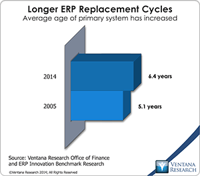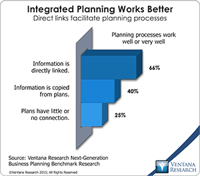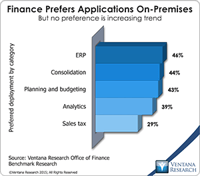The enterprise resource planning (ERP) system is a pillar of nearly every company’s record-keeping and management of business processes. It is essential to the smooth functioning of the accounting and finance functions. In manufacturing and distribution, ERP also can help plan and manage inventory and logistics. Some companies use it to handle human resources functions such as tracking employees, payroll and related costs. Yet despite their ubiquity, ERP systems have evolved little since their...
Read More
Topics:
Big Data,
Microsoft,
SAP,
Social Media,
ERP,
FP&A,
Mobile Technology,
NetSuite,
Office of Finance,
Operational Performance Management (OPM),
Reporting,
close,
closing,
Controller,
dashboard,
Human Capital,
Reconciliation,
Analytics,
Business Intelligence,
Cloud Computing,
Collaboration,
IBM,
Oracle,
Uncategorized,
Business Performance Management (BPM),
CFO,
Data,
finance,
Financial Performance Management (FPM),
Supply Chain Performance Management (SCPM),
Financial Performance Management,
FPM,
Intacct
Tidemark Systems offers a suite of business planning applications that enable corporations to plan more effectively. The software facilitates rapid creation and frequent updating of integrated company plans by making it easy for individual business functions to create their own plans while allowing headquarters to connect them to create a unified view. I coined the term “integrated business planning” a decade ago to highlight the potential for technology to substantially improve the...
Read More
Topics:
Planning,
Predictive Analytics,
Customer Experience,
Marketing Planning,
Reporting,
Budgeting,
Human Capital,
Analytics,
Business Analytics,
Business Collaboration,
Business Mobility,
Cloud Computing,
Governance, Risk & Compliance (GRC),
Business Planning,
Customer Performance Management (CPM),
Financial Performance Management (FPM),
Sales Performance Management (SPM),
Supply Chain Performance Management (SCPM),
Tidemark,
Workforce Performance Management (WPM),
Demand Planning,
Integrated Business Planning,
Project Planning
Whatever Oracle’s cloud strategy had been the past, this year’s OpenWorld conference and trade show made it clear that the company is now all in. In his keynote address, co-CEO Mark Hurd presented predictions for the world of information technology in 2025, when the cloud will be central to companies’ IT environments. While his forecast that two (unnamed) companies will account for 80 percent of the cloud software market 10 years from now is highly improbable, it’s likely that there will be...
Read More
Topics:
Microsoft,
Predictive Analytics,
SAP,
ERP,
FP&A,
Mobile Technology,
NetSuite,
Office of Finance,
Operational Performance Management (OPM),
Reporting,
close,
closing,
Controller,
dashboard,
Human Capital,
Tax,
Analytics,
Business Collaboration,
Business Intelligence,
Cloud Computing,
Collaboration,
IBM,
Oracle,
Business Performance Management (BPM),
CFO,
Customer Performance Management (CPM),
Data,
finance,
Financial Performance Management (FPM),
Sales Performance Management (SPM),
Supply Chain Performance Management (SCPM),
Financial Performance Management,
FPM,
Intacct,
Spreadsheets












